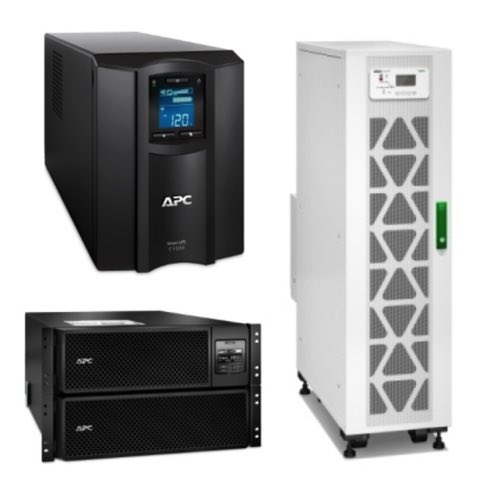Schneider Electric UPS Power Supplies

Schneider Electric UPS power supplies are designed to deliver reliable and uninterrupted power protection for critical equipment across residential, commercial, and industrial applications. These uninterruptible power supply systems provide battery backup during outages, protect against power surges, and help stabilize voltage to ensure sensitive electronics continue operating without disruption. They are commonly used to safeguard IT infrastructure, control systems, communications equipment, and other mission-critical loads.
The Schneider Electric Smart-UPS product line is engineered for high efficiency, continuous operation, and long service life. Advanced battery management and power conditioning features help reduce energy losses and extend battery lifespan, supporting lower total cost of ownership. These UPS systems are designed to perform reliably in demanding environments where uptime and power quality are essential.
Schneider Electric UPS power supplies also offer intuitive monitoring and management capabilities. Real-time information such as load status, battery health, and energy usage can be accessed through user-friendly interfaces and secure web-based platforms compatible with modern browsers. This visibility allows users to proactively manage power systems, plan maintenance, and respond quickly to power-related events.
FAQs
Q: What are Schneider Electric UPS power supplies used for?
Schneider Electric UPS power supplies are used to provide battery backup, power conditioning, and surge protection for critical equipment during power outages and electrical disturbances.
Q: What applications are Schneider Electric UPS systems suitable for?
They are suitable for a wide range of applications, including home offices, small businesses, commercial facilities, industrial control systems, and data center environments.
Q: What is the Smart-UPS series from Schneider Electric?
The Smart-UPS series is a line of high-efficiency UPS systems designed for continuous operation, offering advanced battery management, monitoring features, and reliable power protection.
Q: Do Schneider Electric UPS systems support real-time monitoring?
Yes, many Schneider Electric UPS systems provide real-time monitoring of performance, battery status, and energy consumption through user-friendly interfaces and web-based platforms.
Q: Are Schneider Electric UPS systems designed for energy efficiency?
Yes, Schneider Electric UPS power supplies are engineered to minimize energy losses while maintaining high levels of power protection and system reliability.
Why Buy Schneider Electric UPS Power Supplies from RSP Supply
RSP Supply offers a broad selection of Schneider Electric UPS power supplies designed to protect critical systems from power interruptions and electrical disturbances. Our products support reliable backup power, advanced monitoring, and efficient energy management across a wide range of applications. Customers rely on RSP Supply for trusted Schneider Electric solutions, technical expertise, and dependable power protection components.

